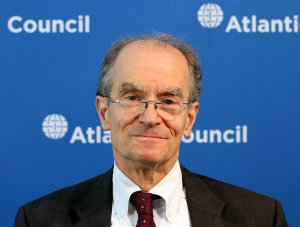Presented By: Center for Emerging Democracies
WCED Lecture. The West’s Democratic Challenge: Central Europe’s Variant and What America Can Do
Daniel Fried, Distinguished Fellow, Atlantic Council; and former National Security Council Senior Director, Ambassador to Poland, and Assistant Secretary of State for Europe

The transatlantic community of democracies – aka “The West” – faces its most profound challenge since the Cold War, and in some ways since the 1930s. Despite the achievement of a Europe (nearly) whole, free and at peace for the first time in history, the West has lost much of its self confidence, and faces challenges from without (Putin’s Russia) and from within. The challenges from within include economic stresses (stagnation, youth unemployment, and widening income disparities, especially in the U.S.), seeming political dysfunction, and issues of national identity. These have combined to generate widespread doubts about the fundamentals of the West’s strategy and even its values that have seemed secure since the early post-WWII period. Much has been written about Central Europe’s nationalist and nativist turn, including “illiberal democracy” in Hungary, populism in Slovakia and Bulgaria, and an inward-looking Polish nationalism. But these are not singular; there is no particular problem with Central Europe, rather, the nations of Central Europe face their own variants of the common challenge which we, the nations of the West, all face. America cannot fix political challenges in Europe, but given America’s history in Central Europe – as champion of national aspirations and democracy during the Cold War and of a united Europe during the generation that followed – America has some agency and responsibility commensurate with that agency.
What can we do? First, showing up is half the battle. The U.S. needs to be present with a strategic message of why the West and its values matter. The 100th Anniversary of the fall of empires in 1918 provides an excellent occasion, especially in Prague, Bratislava, and Warsaw. Second, we need a message to governments and societies that takes account of Central European concerns, especially their sensitivity toward their newly-regained national sovereignty, including in the context of Europe’s difficult debate on refugees. Patriotism and national pride are not the same as chauvinism, though they can degenerate into it. Third, we need to help the Central Europeans defend themselves against Russian aggression, both overt but more importantly aggression via disinformation and propaganda, about which America is learning much. Fourth, without unproductive lecturing, America needs to convey messages when governments in Central Europe put at risk democratic fundamentals. We need to be judicious, not shrill, in our tactics and selective in our battles. Fifth, American leadership in the West, and the Free World more broadly, remains indispensable: when we do not lead, others will fill the vacuum.
In his forty-year Foreign Service career, Ambassador Fried played a key role in designing and implementing American policy in Europe after the fall of the Soviet Union. As Special Assistant and NSC Senior Director for Presidents Clinton and Bush, Ambassador to Poland, and Assistant Secretary of State for Europe (2005-09), Ambassador Fried crafted the policy of NATO enlargement to Central European nations and, in parallel, NATO-Russia relations, thus advancing the goal of Europe whole, free, and at peace. During those years, the West’s community of democracy and security grew in Europe. Ambassador Fried helped lead the West’s response to Moscow’s aggression against Ukraine starting in 2014: as State Department Coordinator for Sanctions Policy, he crafted U.S. sanctions against Russia, the largest U.S. sanctions program to date, and negotiated the imposition of similar sanctions by Europe, Canada, Japan and Australia. Having retired from the Foreign Service in April, 2017, Ambassador Fried is currently a Distinguished Fellow with the Atlantic Council.
What can we do? First, showing up is half the battle. The U.S. needs to be present with a strategic message of why the West and its values matter. The 100th Anniversary of the fall of empires in 1918 provides an excellent occasion, especially in Prague, Bratislava, and Warsaw. Second, we need a message to governments and societies that takes account of Central European concerns, especially their sensitivity toward their newly-regained national sovereignty, including in the context of Europe’s difficult debate on refugees. Patriotism and national pride are not the same as chauvinism, though they can degenerate into it. Third, we need to help the Central Europeans defend themselves against Russian aggression, both overt but more importantly aggression via disinformation and propaganda, about which America is learning much. Fourth, without unproductive lecturing, America needs to convey messages when governments in Central Europe put at risk democratic fundamentals. We need to be judicious, not shrill, in our tactics and selective in our battles. Fifth, American leadership in the West, and the Free World more broadly, remains indispensable: when we do not lead, others will fill the vacuum.
In his forty-year Foreign Service career, Ambassador Fried played a key role in designing and implementing American policy in Europe after the fall of the Soviet Union. As Special Assistant and NSC Senior Director for Presidents Clinton and Bush, Ambassador to Poland, and Assistant Secretary of State for Europe (2005-09), Ambassador Fried crafted the policy of NATO enlargement to Central European nations and, in parallel, NATO-Russia relations, thus advancing the goal of Europe whole, free, and at peace. During those years, the West’s community of democracy and security grew in Europe. Ambassador Fried helped lead the West’s response to Moscow’s aggression against Ukraine starting in 2014: as State Department Coordinator for Sanctions Policy, he crafted U.S. sanctions against Russia, the largest U.S. sanctions program to date, and negotiated the imposition of similar sanctions by Europe, Canada, Japan and Australia. Having retired from the Foreign Service in April, 2017, Ambassador Fried is currently a Distinguished Fellow with the Atlantic Council.